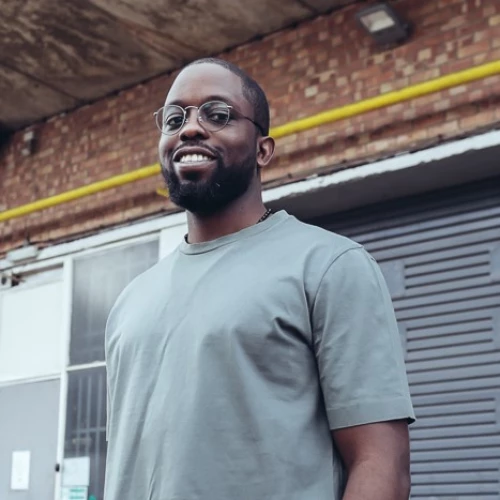What sparked your passion for quantum physics, and led to your pursuit of a Masters in material sciences and quantum computing?
When I was nine, a friend showed me a book about the atomic bomb in Hiroshima. The physics in it showed that all that destruction—with almost 100,000 souls lost instantly —came from converting less than a kilogram of matter into energy. That terrified me. And like a scared, hungry, naked Adam in the Garden, I found comfort in the fruit of knowledge. It all came full circle a bit at the end of my Masters when I published a quantum computing paper in PRL, the same journal Einstein often published in (after all, his E=mc2 led to the bomb that got me on this weird path in the first place).
What role did reading and books play in your early education? Did you always have plans to pursue writing professionally?
When I was proper young, I enjoyed reading the Goosebumps series by R.L Stine (I know… it was a thing back then). As a teenager, honestly, I really didn’t read outside of what they gave us in class. I dropped all humanities subjects when I was 16, so I never dreamed I’d write a novel one day. But the decision to write The Upper World came out of this need to reconcile the mismatched worlds I was inhabiting, both intellectually and socially. I remember one night I got the massive honor of being asked to give a speech at the House of Commons, then went back to my aunt’s place in Peckham where a young boy had been stabbed on the staircase. I started wondering, "How do I make the tougher questions in life 'add up' the way they do in physics?" And that’s really where the inspiration for The Upper World came from: the hunch that I could combine the everyday story of a few kids from South London with the otherworldly physics of space and time. ...and craft a journey gripping enough that the nerds, the street dudes —and the rest of us in between—would all want to read it, and would all get it.
I remember one night I got the massive honor of being asked to give a speech at the House of Commons, then went back to my aunt’s place in Peckham where a young boy had been stabbed on the staircase. I started wondering, "How do I make the tougher questions in life 'add up' the way they do in physics?"
You have studied and worked in different disciplines and industries, do you have any advice for people who are continuing to explore or discover their interests and passions?
Don’t expect people to understand your vision or see your potential until long after you’ve seen it. A fellow BCG alum, Humphrey Wireko, recently said to me, "Imagine how Leonardo da Vinci’s mates would have reacted when he initially pitched the Mona Lisa to them: ‘So, she’s going to be looking off to the side like this and sitting completely normally. Oh, and she’s not going to have eyebrows. And it’s gonna be the most valuable piece of art in human history."
Otherwise, I think having a source of fulfillment that’s deeper than your current project (or the next one) is critical. For me that comes from my faith. It’s helps me stay (somewhat) humble because I know there are wider forces contributing to everything I’ve achieved. It also stops me from turning my work into my God. We know how that one ends…
Can you tell us about an influential experience you had or lesson you learned at BCG that left an impact on your career?
I’ll summarize the main things I learned at BCG in three points:
- Never be scared of problems. Break them down until each chunk is tiny enough to smile at.
- Be ravenously, insecurely hungry for information when you don’t know what you’re on about. Then walk with (slight) over-confidence once you do.
- The best stories contain believable words, surprising worlds, and unbelievable numbers.
What have been some of the most memorable moments from the release of your book, The Upper World, to working as an executive producer on the Netflix film based on your much talked about novel?
Probably the week that my manuscript leaked to the movie people. Speaking to publishers was all quite new for me, but I’d been writing for a couple years, so I had some vague idea of how it worked. But chatting to Hollywood studios and production houses was an entirely novel experience, filled with impressive and bizarre personalities.
I’ve massively enjoyed working with Eric Newman and Daniel Kaluuya, the producers for The Upper World. Eric’s got a lot of experience (he worked on Wayne’s World!) and his advice to me has ranged from how to filter my scattered ideas to how to manage my (highly variable) income. Daniel has an exceptional mind and a great soul. It doesn’t hurt that he’s an Oscar winner and from the kind of world I describe in the book, so the project is in good hands.
What is coming up next for you, is another novel or venture on deck?
I'm knee deep in writing the sequel to The Upper World. In the next adventure, we’ll explore quantum mechanics (vs. relativity in book one) and get to spend some time with Esso’s parents in West Africa and with Rhia at Cambridge University. I’m excited about it. It’s the story I would have written first if I had the confidence to pull it off on my debut.
I’m also working on a film script with a few mates and have built a ‘story algorithm’ (in Excel, true to form) that I use to whip up stories and at some point next year I’m hoping to figure out what/who else it can be used for.


